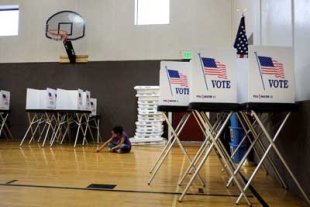As thousands of people on the U.S. East Coast struggle to reset their lives after a devastating storm, now comes the hassle of getting to the local polling station. So with personal technology in our hands that can help us find a parking spot, make a doctor's appointment or pay the mortgage, why can't we just pull out our smart phones or sit down at the computer and vote?
After all, voting by Internet is already happening. Some non-profit organizations use it to elect officers. Corporate boards use it in a similar way. People have been able to register to vote over the Internet for more than a decade. In this election, tens of thousands of ballots from military personnel and people living abroad will be taken in electronically, more or less via e-mail, in more than half of U.S. states.
 The biggest challenge in moving away from polling stations to mobile voting may be psychological. (AP Photo/Jae??
The biggest challenge in moving away from polling stations to mobile voting may be psychological. (AP Photo/Jae??
"The issue is not, 'Is there an app for that?' There is an app for that," said Thad Hall, associate professor of political science at the University of Utah and a researcher at voting technology's forefront. "It's technically feasible to do."
Hall and other experts who have studied the science of voting and the habits of voters say psychology and sociology are as much an obstacle as technology itself, which can often seem to users like a black box. The controversy over Diebold electronic voting machines from 2004 illustrates those concerns, such as how easily they can be hacked. So does the now-debunked conspiracy theory that Gov. Mitt Romney's son, Tagg, owns a stake in the company supplying voting machines to people in Ohio who will use them today to cast ballots in the state expected to decide the presidential election.
"The problems of Internet voting are like the problems of mail balloting on steroids," Hall said. In other words: Voters lose control of a ballot's destiny the moment they drop it in a mailbox. A mail ballot could be intercepted and dumped in a landfill. In the same way, Internet votes could be commandeered by a Botnet herder, altered, sold or destroyed.
[ Related: Check out our Election Day experience ]
In New Jersey this week, ballots sent to the Board of Elections by e-mail theoretically are subject to similar risks, as secure domain addresses from which they could be sent, and received, are not yet widespread. "There are concerns about network security in general, and computer science experts are wary specifically of security issues in the United States when it comes to elections," said Charles Stewart, professor of political science at the Massachusetts Institute of Technology, and co-director of the Caltech/MIT Voting Technology Project.
It's hardly a secret Internet elections have been subject to hacks. One of Stewart's colleagues, engineering and computer science professor Alex Halderman at the University of Michigan, hacked the testbed at the debut of a Washington, D.C., Internet voting system in 2010 and later published the results. He and his students rigged the system to play the Michigan fight song after a vote was cast. In this case, though, the system's developers, interested in testing the mettle of their code, invited those attacks. Though the Michigan team's shenanigans turned out to be above-board, Stewart recalls, "they discovered that the Chinese and the Iranians had beat them to it."
Fear of a catastrophic hack that could destroy the integrity of an election and expose voter identities on a mass scale are difficult to overcome in a similar way that fears of terrorism are difficult to overcome. "One of the most likely situations is that a political person or somebody who wanted to cause problems would hack into the system just to establish the uncertainty," Hall said.
 The small European country of Estonia has figured out voting by Internet. (AFP Relax News)
The small European country of Estonia has figured out voting by Internet. (AFP Relax News)
Despite the potential for democracy hijacking, one country has managed to make Internet elections work?Estonia, the tiny Baltic Sea nation that gave birth to, among other things, Skype. A major difference between that country and the U.S., however, is the political system: Estonia has four major parties, six in all. A vote for an Estonian candidate may not go to the winning party, but probably would end up with at least partial representation in a coalition government. "Allegations of fraud are much higher in places where there are two parties," Hall said, "because it's easier to say, 'My candidate lost because of fraud,' rather than because I have a crappy candidate."
The U.S. population, more practically, is about 300 times Estonia's. Voting is decentralized, and each state of the union has its own set of election laws. Paper ballots are published according to regulations that can go deep into the weeds, requiring specific fonts, spacing and multiple languages, making them nearly impossible to render on a mobile phone or similar device. "Sticking a meaningful ballot on a smart phone or a cell phone is a usability issue," Stewart said.
Hall said he sees the electronic process growing organically, though, from communities where it's most needed. The first likely step forward would be kiosks that resemble today's electronic voting machines, but with input transmitted via the Internet, and with some type of established paper trail. The Pentagon has already experimented with and used variations on the kiosk setup as part of its Federal Voting Assistance Program, though a report Sunday in the News & Observer of North Carolina prompts some questions as to whether the military pushed the program too fast.
Further in the future, Internet voting could transpire in the same the way we might buy concert tickets online today: A secure transaction followed by a printable receipt?like a ticket, but with an extra precaution: Some sort of code that could be used to verify results and identity.
There are, of course, benefits beyond convenience. Tanya Clay House, public policy director at The Lawyers' Committee for Civil Rights Under Law, an advocacy organization for minorities, sees the potential for putting the vote in more hands. "If there's a way to protect security and privacy, we would absolutely like something like [voting by smartphone] to occur," she said. "Lower-income and minority communities...tend to have more access to smartphone technology than [the] Internet, because it's cheaper."
Finally, though, the most significant factor holding up smartphone voting may be the public, which is not yet clamoring for personal technology applications to cast important votes. A 2008 report by the Caltech/MIT project ranked absentee voting by Internet second to last in a list of improvements voters would like to see. Higher priorities on the list? Making Election Day a holiday and being able to vote on weekends.
Source: http://news.yahoo.com/blogs/ticket/why-t-vote-iphone-may-app-isn-t-122835647.html
2012 nfl mock draft iowa caucus lemonade diet steve jobs action figure chris jericho rose bowl johnny weir
No comments:
Post a Comment
Note: Only a member of this blog may post a comment.